#Asahi Sonorama
Explore tagged Tumblr posts
Text

Monthly Halloween (月刊ハロウィン) / Asahi Sonorama (朝日ソノラマ) / Jan 1994 issue
#shojo manga#retro shojo#90s manga#horror manga#90s horror#asahi sonorama#issue month: january#月刊ハロウィン#朝日ソノラマ
23 notes
·
View notes
Text

Cover for a Tiger Seven sonorama.
#Tiger Seven#Tetsujin Tiger Seven#Iron Man Tiger Seven#Asahi Sonorama#tokusatsu#P Productions#Japanese superheroes
23 notes
·
View notes
Text

それはある日の魔法使いです!
#the wonderful wizard of oz#ozu no mahoutsukai#asahi sonorama#atsuko nakamura#satoru inoue#picture book#japan#1980
13 notes
·
View notes
Text


ASAHI SONORAMA 朝日ソノラマ Incremental Halloween EX DARK MOON
Volume 3, February 1992 Issue
Volume 2, July 1991 Issue
Source
#Ex Dark Moon#ASAHI SONORAMA#朝日ソノラマ#vintage manga#avant garde manga#magazine#vintage magazine#japanese magazines#manga magazine#Incremental Halloween EX DARK MOON#horror manga
15 notes
·
View notes
Text

出渕裕 / NEOS 出渕裕デザインアート
79 notes
·
View notes
Text
Omg... look what I found so cute!

Credit to owner ♡
#haikyuu#haikyuu x reader#haikyuu fanart#hinita shoyo#kageyama tobio x reader#Kageyama tobio fanart#Hinita shoyo x reader#Hinita shoyo fanart#yu nishinoya#Yu nishinoya x reader#Yu nishinoya fanart#asahi sonorama#asahi x reader#Asahi fanart#Karasuno fanart
51 notes
·
View notes
Text

1 note
·
View note
Text

Dolls
4 volumes.
Licensed by Viz Media, but out of print.
Yumiko Kawahara's disturbing short stories explore the strange and codependent world of dolls and the people who own them.Both quirky and unsettling, these science-fiction morality fables question the dark side of love and pride.Fair warning: When you live inside a dollhouse, it's hard to tell who's the puppet and who's the master...
Status in Country of Origin
4 Volumes (Complete)
Tags:
Collection of Inter-Linked Stories
Collection of Stories
Dark Ambience
Doll/s
Episodic
Gothic Ambience
Interconnected Episodic
Puppet/s
Reflections on Human Nature
Uncommon Services/Store
#Dolls#Kanyou Shoujo#KAWAHARA Yumiko#drama#fantasy#horror#josei#psychological#romance#supernatural#tragedy#viz media#Asahi Sonorama#nemuki#completed#1991#1990s#manga
0 notes
Text
Big Vampire Hunter D News!
Through the Facebook fan group I'm in, I learned that the VHD manga is finally continuing after a 10 year hiatus.
That's right, it's not a dream, the manga is back! This time in webcomic form, with chapters being released bi-monthly, on the 15th and 30th of each month.
For now, the manga is only in Japanese, and can be read on Asahi Shimbun Publication's official website, Sonorama+.
The manga is furthering D's story right now with volume 9, The Rose Princess.
With help from google translate, I've read the chapters currently posted. I'm so happy. The Rose Princess is one of my top fav books, and I'm beyond excited to see the rest.
83 notes
·
View notes
Text
Summer Of Godzilla Gallery - Asahi Sonorama Book/Record Art

18 notes
·
View notes
Text

Monthly Manga Shōnen (月刊マンガ少年) / Asahi Sonorama (朝日ソノラマ) / Dec 1980 issue
#vintage manga#shonen manga#retro shonen#80s manga#cyborg 009#>100 notes#asahi sonorama#issue month: december#月刊マンガ少年#朝日ソノラマ
118 notes
·
View notes
Text
Asahi Sonorama

1K notes
·
View notes
Text

Cover to Part Two of the Asahi Sonorama for Destroy All Monsters (1968).
#Destroy All Monsters#Moonlight SY-3#Baragon#Rodan#Mothra#Manda#Anguirus#Angillas killer of the living#Gorosaurus#kaiju#mecha#Toho#Sonorama#Asahi
151 notes
·
View notes
Text
1. The Birth of Astro Boy
It should be noted that this is not the first Astro Boy manga chapter ever written, but was written in 1975 by Tezuka to give the series a more approachable beginning for Asahi Sonorama's edition/compilation of the series.
Note: Throughout this post, I will refer to the whole series as "Astro Boy" but refer to the character as "Atom." If I get mixed up and refer to him as "Astro" once the text is calling him this, we will just have to live with that because I intend on calling him Atom mostly. If this changes later I'll add a new note to whichever post it becomes relevant on.
I'm not making a timeline here, but as "present day" is 2003 (Edit: No it isn't. It's 2012, probably...?), the introductory information states that around 1953, robots "existed in great number" but it took many machines to do the work of a single human.
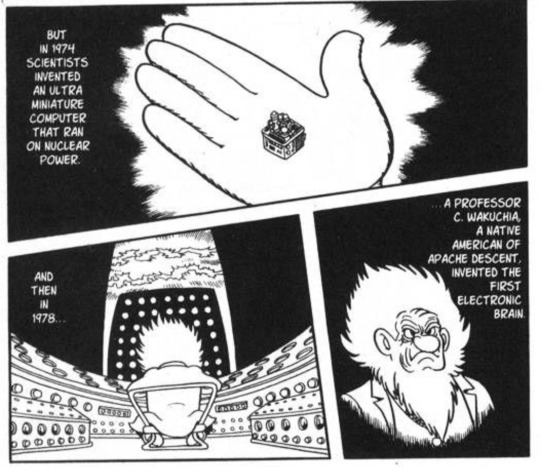
In 1974 our first breakthrough in robotic technology is the "ultra-miniature computer" that runs on nuclear power. This is followed by Professor C. Wakuchia's invention of the first electronic brain 4 years later in 1978. It's also interesting that the manga notes he was of Apache descent. The Japanese professor Sarumane "copied and improved upon the design" and it was used in the first humanoid robot in 1982.
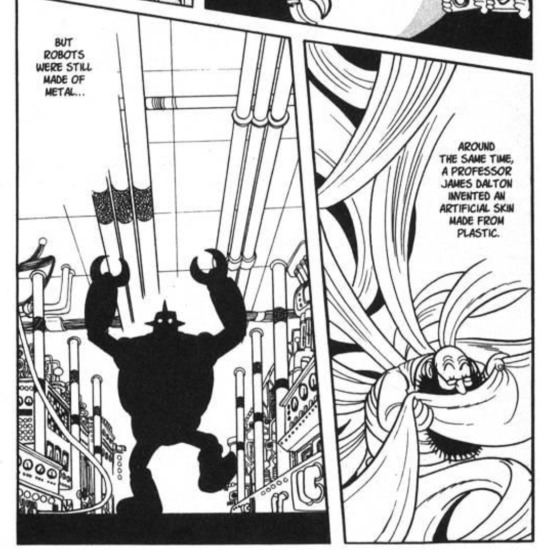
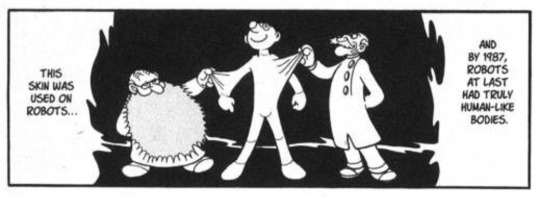
An interesting diversion from the modern-day expected progression of robotics (that being primarily in AI, something not heavily focused on in the original manga and presumably captured entirely by the sentence "First electronic brain") is a heavy focus on that robots were made of metal until Professor James Dalton invented an artificial plastic-based skin in the early 1980's. By 1987, "robots at last had truly human-like bodies."
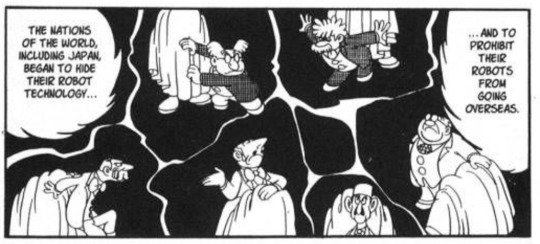
We start seeing that an important element of robotic development was that around this point, countries became protective of their technologies. Another anti-capitalist anti-militarism W for Tezuka here, and I'll likely end up referencing this later when it comes to international relations in the world of Astro Boy.
While Tezuka didn't heavily stress this, I think it could also be interesting to think about what each country and culture would desire in their robots, and what their own personal goals would be to create a highly advanced robot. Is a truly advanced robot capable of independent decision making, or is it subservient? In what ways is it similar to a human? Can it taste? Cry?
5,000 robots per year in Japan is a "very quick" increase in population, especially in Tokyo. I also think it's notable that "Robots even began studying in schools along with human children" - For a robot like Atom, who is made to be akin to a human, this would make sense, but we see in later Astro Boy media that the idea of robots needing to go to school at all (outside his circumstance) kind of gets lowered quite a bit. I can see why - The benefit of school for a robot who can acquire all the information needed rapidly through either downloads or reading it or having it delivered through audio or video is exclusively social (which is what Atom needs it for, too, although he also receives the information he's learning through school as well instead of through download in the original manga, and as far as I know, the 60s, 80s, and 03 anime) and a robot does not need to learn social skills in the same way a human child does. From an American perspective, around the time the original manga was being created African Americans were actively pushing to remove segregation in schools, and I think this whole movement and reaction to it influenced later Astro Boy media as well, as at its core I believe Astro Boy is about what it means to be human, and therefore, human rights.
From a lore perspective, I agree more with the modern take that robot children would be segregated from human children in schooling and that moving Atom to a human school would be a step that received notable pushback. Robots are (from the belief of many humans) intended to be subservient and do not need the social development of having human friends as equals. If a human had a problem with a robot child, the robot child would be expected to resolve the problem entirely, even if it were not their fault. I also think that the idea of robotic children as they appear in Pluto is extremely interesting (but this isn't the place for that discussion so I'll keep it brief) as they are for the development of the parent robots and the idea of a robotic child ends up limiting the ability of the child robot to develop - If a robotic child could develop, they would no longer be childlike. We don't really see anything about developing child robots into another State in Pluto, so this leads me to believe that a child robot would be kept at a certain level of human development without much of a chance to grow from there (thus making it strange to have a child in the first place - Is the joy of a child not seeing them grow? And we do see some of this in Pluto, that one of their fondest memories with Robita is her walking for the first time, a similar experience to what human parents experience with their own children who do grow and change.) The lack of growth of child robots is also sort of touched on in another original Astro Boy comic, so I'll touch on it later too.
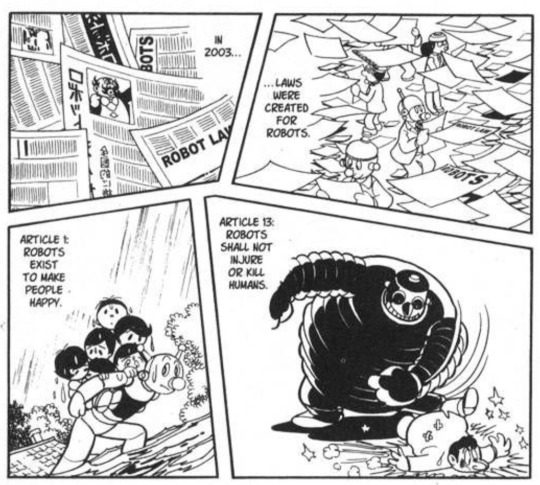
These are the two robotic laws we know so far, and if/when we see more of the robotic (production) laws, I'll be listing them together.
These laws being of robotic production are interesting - If a robot does not prioritize human happiness over their own, this robot is technically against the robotic laws. If a robot injures or kills a human, this obviously results in the robot being disassembled, but it seems like it would also result in their creator being charged as well, as the robot was able to do those things by virtue of the creator not putting in enough safeguards. Again, Pluto plays with this a lot more (robots are capable of harming humans but don't.) (but Pluto doesn't touch on creators of robots also being at fault) but if/when we get to a Pluto analysis, I'll be discussing it then.
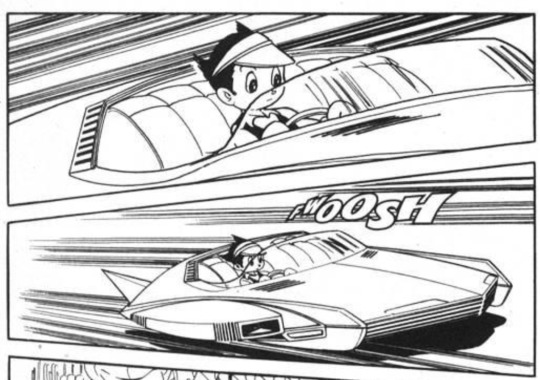
We can see here that human child Tobio is driving a car. This is mostly funny to me - If the robotic car is safe enough for a child to ride in alone, why are his hands on the wheel? Why did it crash at all? Would that crash not be the fault of the robotic car's manufacturer, then? The idea that this accident should be blamed on Tenma (introduced at the very latest in the 1980s anime) is interesting considering this. By 2003 we don't even see him driving a car, he has something more like a bicycle.
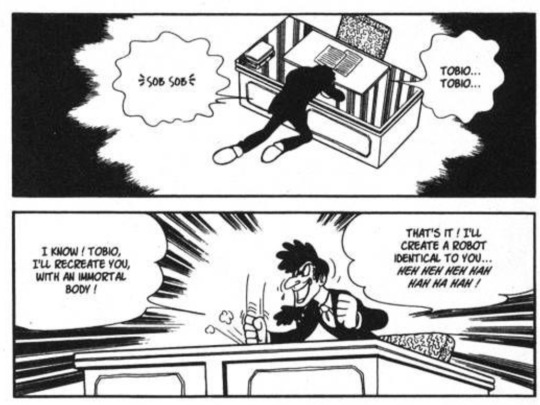
Yea that makes sense. Go ahead and do that man. God I love this series.
Anyway our stress here is on "immortal body" and the goal of having Tobio back, but unable to die. No mention of the weapons and shit he's putting in there but that's probably why.
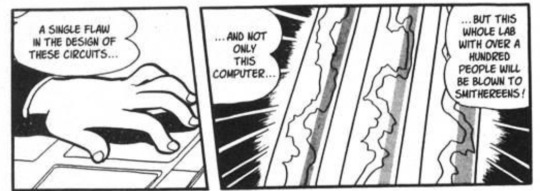
smithereens are basically the most classic thing to blown to.
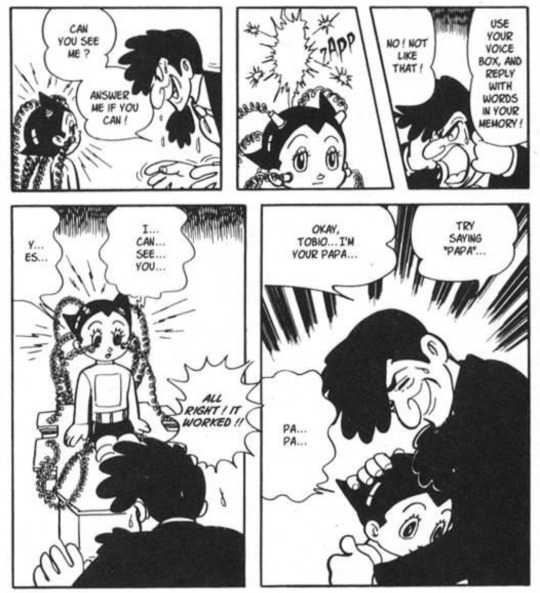
Hooogh I'm normal about it.
First indication that a problem with Atom (for Tenma) is his robotic nature, despite that being something He Did in making him. His natural response is not human enough, and Tenma's response (likely partially for humor) is to yell at him and get angry. I'm also very fond of Atom's facial expressions not being developed yet. That kind of thing is just really special to me, it shows that a lot more work still needs to go into this from both of them to achieve what Tenma really wants - and most of that work is in counteracting the natural way Atom is liable to act and having him emulate humans more closely.
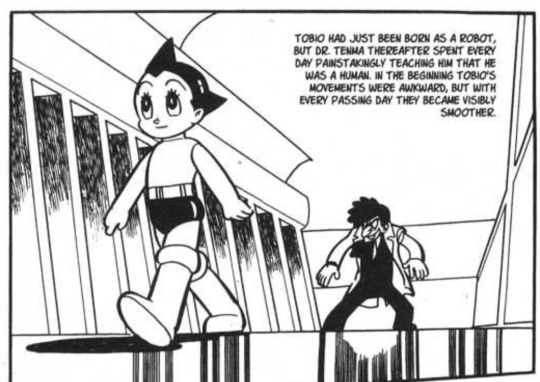
Difficult to say at this point if the original manga has Atom believing initially that he is a human, we do see more play with this in the first episode of the 1980's anime, but it's not really touched on that hard within Astro Boy itself as far as I remember (I suppose the 2009/10 movie does a little, lol, and so does Pluto.). That said, a robot believing themselves to be human is much more notable in Metropolis.
If I were da boss. and I were making my own interpretation of Astro Boy, I do think I would play with this more. The identity crisis element would be really intriguing to me, especially considering that a robot that believes themselves to be human would believe they were above the robotic laws, and the crisis in discovering not only that your identity and self is a lie but also that you are now disallowed from things you previously did not know you were disallowed from and suddenly your own happiness is not allowed to be your priority. I think it would drive some of the robotic rights stuff home a little (although, and I may be wrong, I don't believe the original run of the manga ever really touches on the idea that robots might be entitled to their own happiness over the happiness of humans if the two do not interfere with one another. If I'm wrong we'll see! I have memory issues so some things will be a surprise to me as well even though I reread this series somewhat frequently)
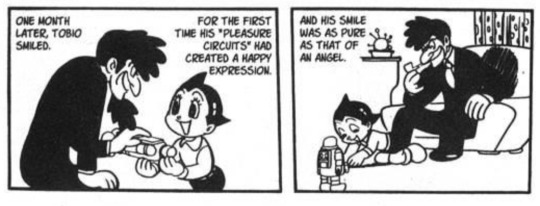
YEAG IT WAS. IT WAS AS PURE AS THAT OF AN ANGEL YOURE SO RIGHT
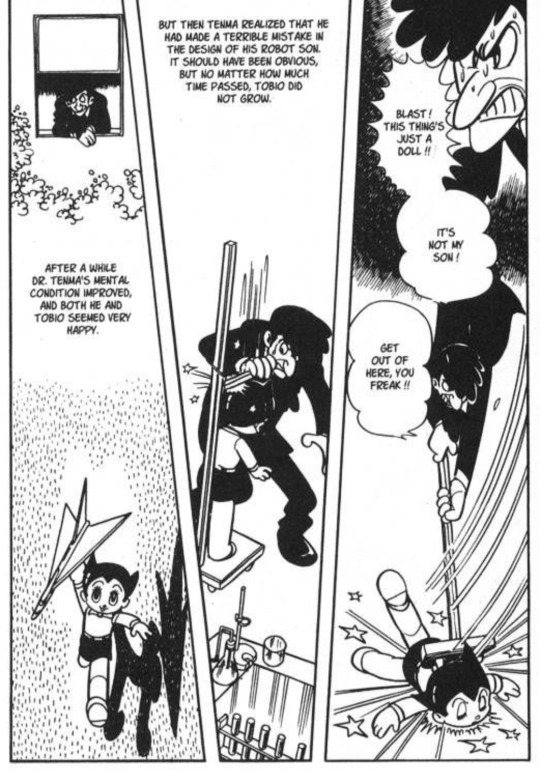
Kind of already started touching on this - But yeah, the unhappiness here (as well as in 1960's anime) comes from him not physically growing, which is funny because You Probably Could Have Made Him Do That In A Number Of Ways But You Shoved A Bunch Of Rockets And Guns In There Instead. I will also touch on one of the ways in a comic where it is made clear to be an option - A robot's brain can be transferred between bodies, so a new body can be made to suit a robot if they prefer, rather than like, surgically changing what is present.
In 1980, the problem is that Tenma believes that the lack of progress on Atom becoming more human is unresolvable.
In 2003, the problem is that Atom is too similar to Tobio, and Tenma does not want Atom to hate him in the same way Tobio did.
I actually do think that the 2009/10 movie was onto something with this because the problem there is that Atom is too similar to Tobio, but Tenma did not know his son and is under the impression he is different. That's a genuinely interesting approach. Atom is doing things Tobio would have done, acting as Tobio would have, and Tenma is like. This is nothing like my son. Because he just didn't know him he never gave him the time. This forces him to reckon with his own grief just the same - He sees the "differences" in Atom and Tobio and is reminded that his son is gone.
In Pluto, the problem is that Atom is too eager to please Tenma and is not similar enough to Tobio. Atom enjoys things and is happy about things, but Tenma remembers that Tobio hated those things. He brings it up, and Atom is like, okay I'll be more like him. But the fact of the matter is that Tenma knows there are fundamental differences now, and this is a different child. He's forced to reckon with his own grief (despite his best efforts to bring Tobio back) in that his son is gone.
The last two are a lot more about grief than they are about inadequacy, and I like that a lot. It's not in any way Atom's fault that he's rejected - It's that the premise of his existence is flawed. A father can't replace their lost child.
The unhappiness coming from Atom not physically growing is notable though, in the same way I mentioned robotic children earlier. They can't grow, that's an important part of who they are. They are created to be children, they can be nothing but children - But a human child is a growing thing, and a human child is defined by the fact that they are changing - they are becoming less childlike every day. A human child is defined by impermanence, and trying to make a child that will not cease to be a child, by death or otherwise, will make a child that is not a child at all.
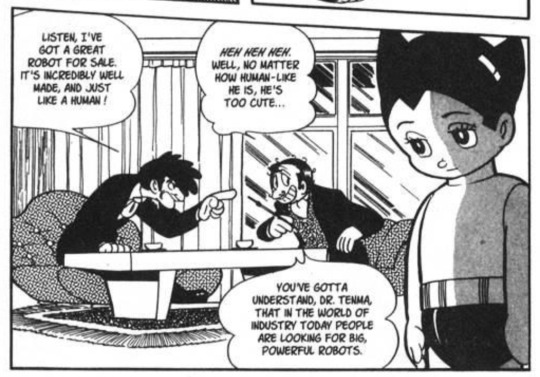
He's so funny for just trying to sell him to any old guy who runs a robot fighting ring after spending like presumably hundreds of millions of Japanese taxpayer dollars on this robot.
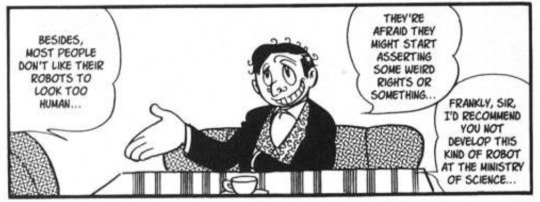
Ahh! Most robots are not created to look human, but Atom is. He's fundamentally representative of a lack of boundary that humans want to ignore. Why would someone want a robot that is not subservient?
To be frankly honest I feel that Pluto missed out on some of this - I like the more explicit approach to hate groups but they don't ever really discuss why they hate robots beyond "they put humans out of a job." I think there's a lot of interesting stuff to be explored here!
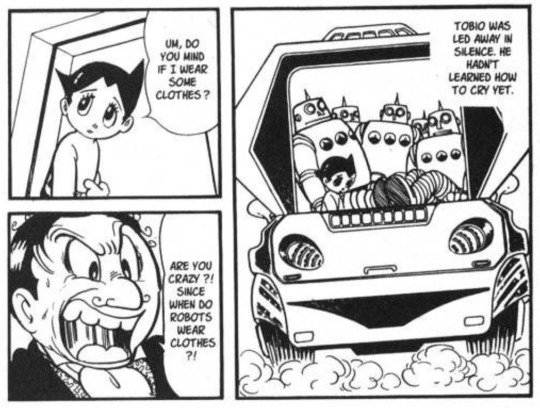
Now that he's no longer being used to replace a human child, he's reduced to the same level of robot as others. I may be wrong in remembering this, but I believe in 2003's anime we do see some robots being like, "Atom is a privileged robot and doesn't really represent us - many of us have a built-in purpose, many of us do not have the right to self determination he has. Many of us do not have the humanity he is given, but he is meant to represent us just the same."
The fact that he's had access to these experiences already puts him between robot and human.
Also, "He hadn't learned how to cry yet" is devastating.
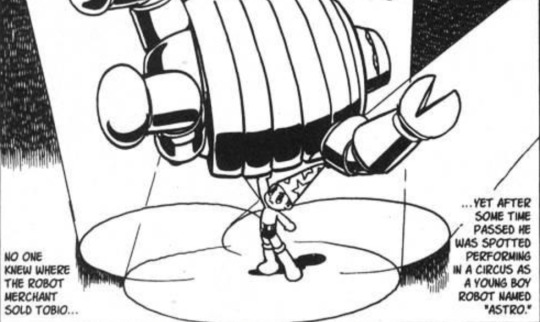
It's interesting that Hamegg is not the circus ringleader here as he is in some later iterations (although, I'm biased, I prefer 2003's approach where he is not sold to a circus at all but rather disposed of and Ochanamizu finds him and brings him back. Sue me.)- So actually, Tenma just sold him to some guy who would sell him elsewhere.
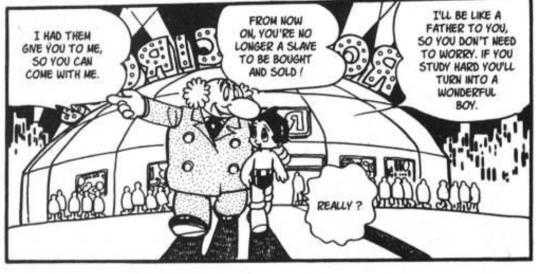
Wow that was easy!
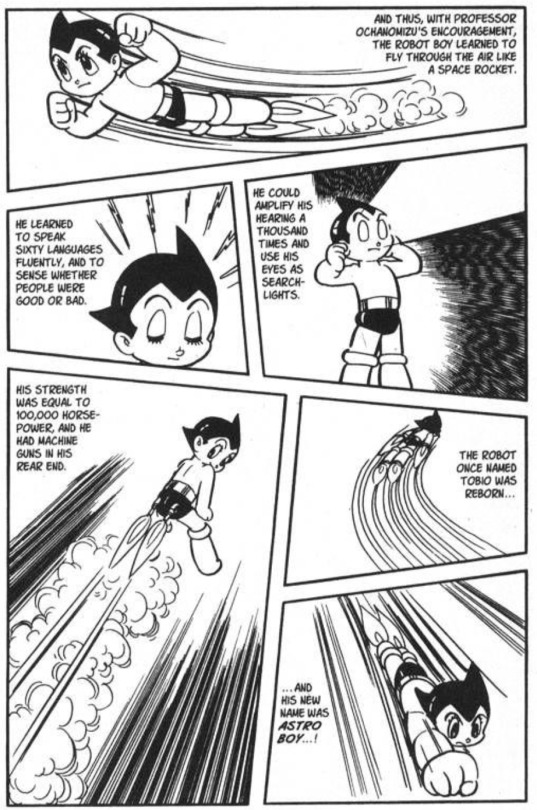
(guy who hates dichotomies between good and bad alert) Nice dichotomy idiot. now what lies outside it.
Thanks for getting through this long analysis of (checks book) 23 pages of content. I should have a little less to say about most other chapters but this one has a lot to chew on.
#astro boy manga analysis#astro boy#mighty atom#tetsuwan atom#Please respond if you feel like it! I'm pretty sure no one at all is going to read this actually.
34 notes
·
View notes


